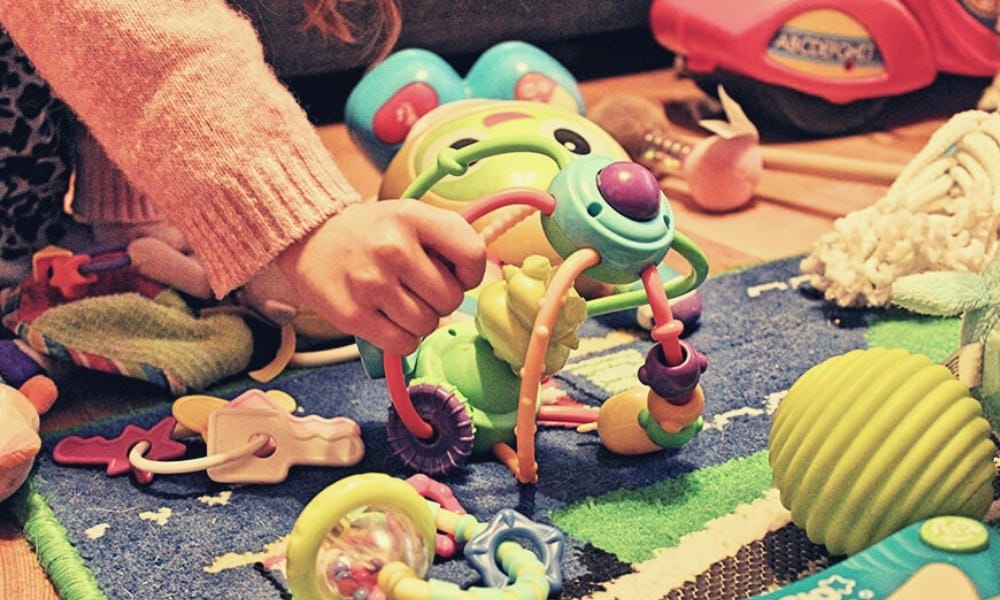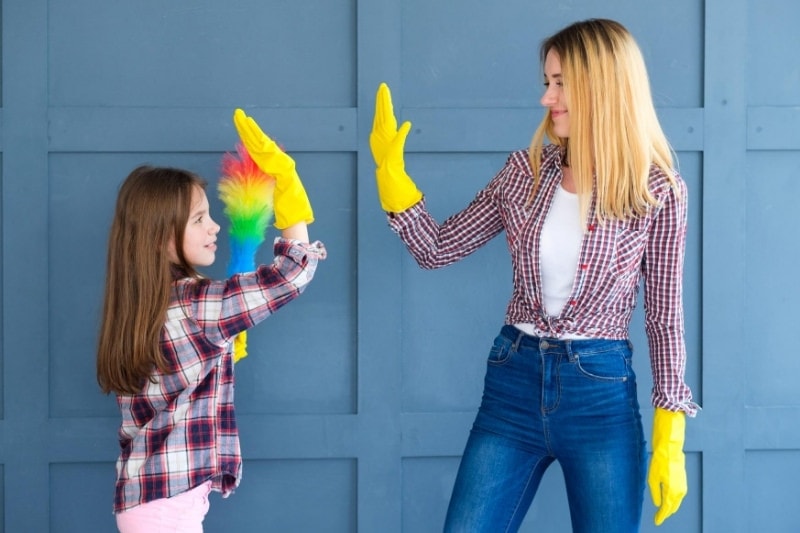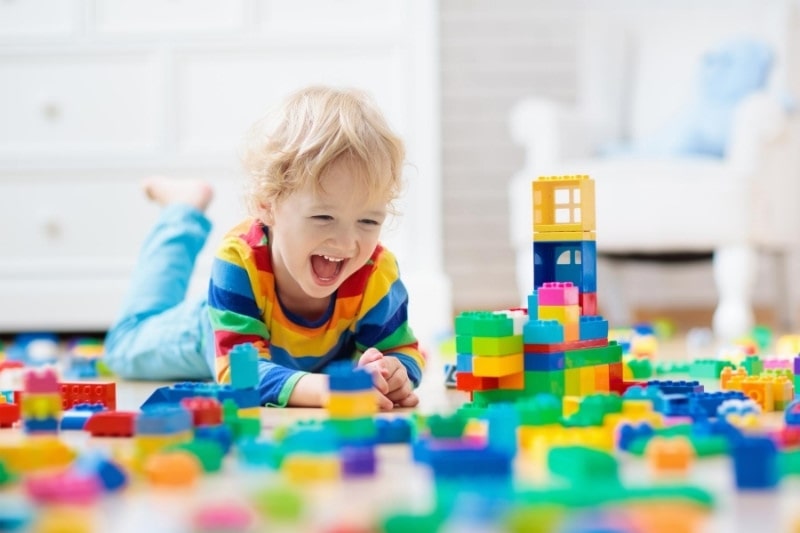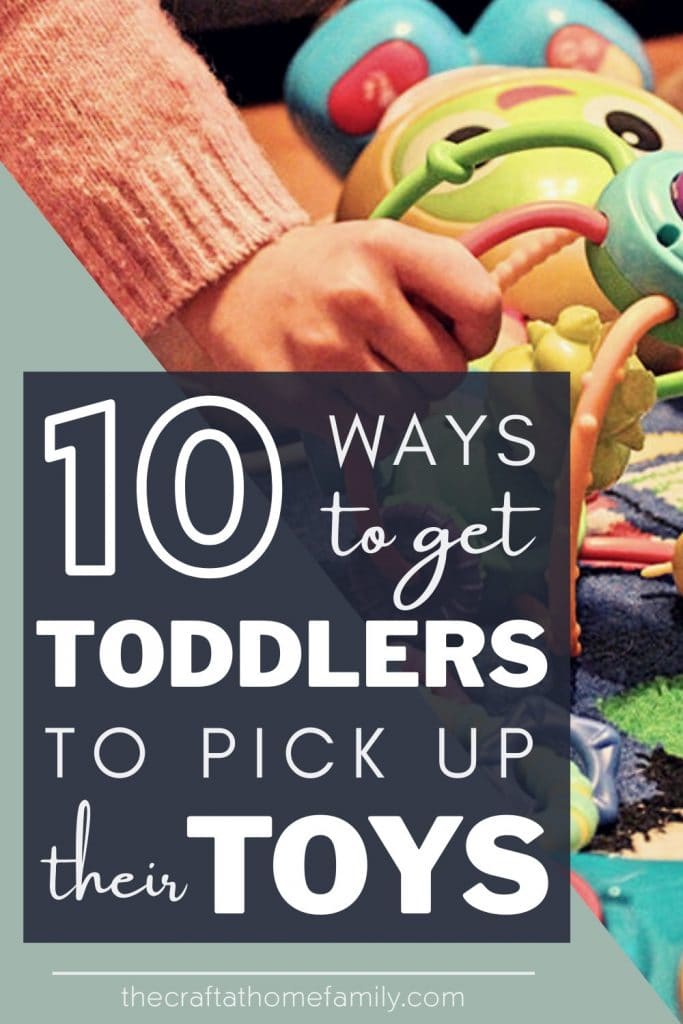Getting kids to help out around the house is a great idea—in theory. But in practice, it’s not always an easy thing to do, especially with younger kids. If trying to get your toddler to pick up their toys is making you pull your hair out, try doing these 10 things to make the process go a little more smoothly!

This post may contain affiliate links, which means I may receive a commission, at no extra cost to you, if you make a purchase through a link. As an Amazon Associate, I earn from qualifying purchases. Please see my full disclosure for further information.
JUMP TO…
We all want our children to grow up to be self-reliant, and assigning chores is a great way to achieve that. Asking kids to help out around the house has many benefits, including teaching them life skills, improving their self-esteem and time-management skills, helping them develop a good work ethic, and giving them a better appreciation for the work that goes into running a household.
Unfortunately, that knowledge doesn’t make toddlers any more cooperative when comes the time for them to pick up their toys!
Let’s be honest. Getting toddlers (and even older kids) to do chores is a lot of work. In the short term, most things are much easier and less time-consuming if you just do them yourself. But that’s likely to result in more frustration in the long term as your children become used to you doing everything for them and don’t develop confidence in their ability to do things for themselves.
So even though it may sometimes seem like an impossible task, getting your kids to help out from a young age builds good habits that will spare everyone frustration in the long run!
If you’d like your toddler to start picking up their toys but aren’t sure where to start, or if you’ve tried to get them to pick up and have found yourself feeling frustrated and overwhelmed, here are some tried-and-true tricks that have worked for our family!
1. Make It Predictable

Before I became a stay-at-home mom, we didn’t consistently ask our children to clean up their toys. I was in university, my husband and I were both working and if we managed to get the kids fed, bathed and in bed before 9 PM, we considered it a victory. We figured since they spent most of the day at daycare, the mess wasn’t that big anyway, so it wasn’t a big deal for us to spend a few minutes cleaning up after they’d gone to bed.
The result was that when we did ask them to clean up, they always fought it. Why were we suddenly asking them to clean up when we normally did it ourselves?
When our kids stopped going to daycare, they decided to put their extra time at home to good use and the size of the mess grew exponentially. Instead of taking us a few minutes to clean up after they’d gone to bed, it would easily take half an hour. We decided that enough was enough, and that it was time for them to start picking up their toys themselves.
They resisted for a few days, but kids have a way of falling into routines pretty quickly. In our house, the time to pick up toys is after nap time. After—and only if—the toys are all cleaned up, they are allowed to watch a little bit of TV while supper is being prepared.
Every afternoon is predictable: nap time, clean-up time, TV time, supper time. We simply added clean-up time to our existing routine. So they know exactly when they are expected to clean up, and they also know that the next step—watching TV—can’t happen unless they complete the previous one.
Of course, you don’t need to follow the same schedule that we do. Perhaps cleaning up after supper instead of before makes more sense for your family. Just take a look at your routine and figure out the best time to add a new element to it.
Once you’ve figured it out, keep everything else identical and try to follow your new schedule as consistently as possible, giving warnings a few minutes before it’s time to clean up so your kids know what to expect. They might fight it in the beginning, but they should get used to it pretty quickly, especially if the next item in your daily schedule is something that they look forward to.
2. Break It Down Into Steps
If you’re looking at the mess your kids have made and feeling overwhelmed, chances are they are too.
If there are toys everywhere, they won’t know where to start. Make it easier for them by breaking down the mess into smaller sections and cleaning them up one at a time. For instance, you could start by cleaning up all the toys in one pile or corner of the room, or by cleaning up only one category of toys, like books or blocks.
Sometimes, when we are getting near the end, I’ll move all of the remaining items into the same area so the kids don’t get distracted running around everywhere looking for stray toys. No matter how you decide to break it down, setting specific goals will help your children feel less overwhelmed and focus on the task at hand.
And if your kids like to make their own decisions, you can foster their independence and sense of responsibility by letting them decide which step to tackle first!
3. Offer Specific Choices
My children often ask me, “Mommy, what can I clean up?” Then, when I give them a suggestion, they reply, “I don’t want to clean that up! I want to clean this up instead!” (Have I ever mentioned how strong-willed my kids are?)
Avoid this problem by giving specific options to choose from. Instead of asking them to clean up the blocks, try saying, “Would you like to pick up the blocks or the farm animals?” This usually works with our two-year-old because she feels like she got to choose rather than being told what to do.
As for our three-year-old, no matter how we phrase things, she inevitably chooses something totally different from what we suggested. I’m not quite sure why she bothers to ask us for suggestions, but at least it makes her feel like she’s in control and she’s usually pretty good about completing jobs she assigned to herself.
4. Use Teamwork

Kids like to feel like they’re not in it alone. Ours like to team up to clean up certain areas or toys more quickly. Often, our two-year-old hands books to her older sister, who then places them on the bookshelf.
They also like to involve whichever parent is helping them clean up. They’ll say things like, “Mommy, I’ll pick up the food and you pick up the plates!” and then happily follow through if they see that I’m participating too rather than leaving them to do everything.
5. Bring the Bins to the Toys
This point depends on the particular type of toy storage you use, but if the bins you use are small enough to be carried, like ours, consider removing some of them from the storage unit and bringing them right to where the mess is while you’re cleaning it up.
This trick is a huge time-saver if, like our two-year-old, your kids insist on only picking up one item at a time and then bringing them to the bins as slowly as possible.
6. Make It Fun

Kids will be a lot more willing to pick up if you can find ways to make it fun for them. Below you’ll find a few suggestions on how to do this.
Use Imaginative Play
Use imaginative play while cleaning up. For instance, you could pretend that the toys are racing to the bins or that you are putting them to bed.
If you’re running low on inspiration, follow your children’s lead—with a little prompting, they will probably come up with all sorts of creative ideas. Just the other day our three-year-decided that cleaning up meant we were “picking up the trash”. I guess somehow that’s more fun than picking up toys? Gotta love the way little kids’ minds work!
Count the Toys
If your kids know how, count the toys as you put them away. Our three-year-old loves to do this.
Make It a Game
Turn cleaning up into a detective game where your children need to find and put away all the toys that have a certain attribute, such as their colour, size, texture or theme. You can also ask them to tell you to colour of every toy they put away.
Play Music
Play music while you clean up. Consider creating a special playlist that you only play while cleaning up so your kids will look forward to hearing it.
Turn It Into a Race
See how quickly you can get all the toys cleaned up and who can do it the fastest! For instance, try to determine who can pick up the most blocks before the end of a particular song.
Sing a Clean-Up Song
Use your children’s favourite song to describe what you’re doing.
We like to use the tune of Mary Had a Little Lamb and sing things like, “This is how we sort the blocks, sort the blocks, sort the blocks, / This is how we sort the blocks to put them in the bin” or “This is how we close the books, close the books, close the books, / This is how we close the books to put them on the shelf.”
The tune won’t always match the words perfectly, but it doesn’t matter. Your kids will still enjoy it, and as a bonus, it might even help them improve their language skills.
We use the same trick when we’re washing our hands and doing laundry. In fact, our official laundry song (once again to the tune of Mary Had a Little Lamb) is: “Put the clothing in the wash, in the wash, in the wash, / Put the clothing in the wash so they can be cleaned.”
7. Have Realistic Expectations
Toddlers may be capable of picking up their toys with the right encouragement, but they are still developing and their abilities have limits.
I would love to be able to ask my kids to pick up and then go into the other room to make supper while they get it done, but unfortunately, getting toddlers to pick up their toys (or do any chore) is very hands-on. Because of their age, they constantly need to be reminded of the task at hand and given specific instructions about how to complete it, so expecting anything else is bound to result in frustration.
Instead, understand your children’s limits and adjust your expectations accordingly. And whenever you’re feeling discouraged, just remind yourself that they won’t be this little forever and that by being hands-on now, you’re building good habits that will allow you to be more hands-off once they’ve reached the appropriate stage of development.
8. Keep Your Cool

If a toddler is refusing to pick up, no matter how frustrated you may feel about it, getting angry won’t solve anything. I speak from personal experience when I say that turning it into a power struggle will leave everyone feeling upset and will make your children even less likely to cooperate.
If you’ve done everything you can think of to get them to clean up and they’re still not doing what they were asked to do, just take a deep breath and go on with your day.
If applicable, calmly explain to them that they can choose to clean up or not, but that if they choose not to, then they won’t be able to participate in the fun activity that comes next in your daily schedule. Then, if they still refuse to clean up, follow through on that consequence.
Integrating cleaning up into your daily routine makes this a lot easier, since not getting to participate in the next activity is a logical consequence that is directly related to their refusal to clean up.
Depending on the situation, you can also try removing the toys that they refuse to pick up, or calling upon the Toy Fairy to do so during the night if you prefer a more whimsical approach!
9. Focus On the Positive
You don’t have to wait until every single toy is picked up to make your toddler feel like they’ve accomplished something to be proud of. Whenever they complete one of the goals you’ve set, like picking up all the blocks or cleaning up one area of the living room, be sure to point it out to them!
And instead of focusing on how much is left to clean up, focus on how much has already been put away. Remind them of how many toys they’ve already picked up and how little is left for them to do. Framing it this way will give you toddler a sense of accomplishment and will make the remaining work seem more achievable!
10. Reinforce Good Behaviour

What Is Positive Reinforcement?
It’s been shown that children respond better to positive reinforcement than to punishment. This means that if they receive a reward as a result of performing a certain action, they will be more likely to repeat that action.
It’s important to note that a reward doesn’t have to be a material object. It can be an activity that they like, or even just a high-five or a compliment.
In fact, praise is often the best reward. You want your kids to keep cleaning up because they’re proud of their behaviour, not because they expect to be rewarded with gifts!
How to Reinforce Good Behaviour
When you do compliment your children, try to be specific so they know exactly which behaviour they should repeat. Compliments that are too vague and that are related to their person rather than to their behaviour can actually damage children’s self-esteem, because if they feel that they are behaving in a way that is not consistent with what they’ve been praised for, they will start to question their view of themselves as well as the sincerity of your compliments.
If praise isn’t working, you can try using a more tangible reward system such as a sticker chart. Some people swear by them while others avoid them because they’re scared that their kids will come to expect a reward for everything.
Personally, I believe that the truth is somewhere in the middle. I think reward charts can be a powerful tool if used on a temporary basis to modify a specific behaviour. Then, once the behaviour has been corrected, the chart can be slowly fazed out by way of spacing out the rewards.
We used this technique successfully when I was nine months pregnant with our youngest and our two older children decided they no longer wanted to cooperate at bedtime—keep an eye out on my blog article on this topic if you’re interested in knowing how!
Finally, if your children begin to pick up without being asked, make sure to point it out and praise them for it. The goal, after all, is for them to start cleaning up independently, so complimenting them for taking initiative and acting responsibly is extremely important!
Related Toddler Articles
Does your toddler like to destroy things? Check out this article to find easy activities that will help channel their destructive energies:
To receive parenting tips, activity ideas and more right in your inbox, sign up for my newsletter using the form below! You’ll gain access to my free printables library as well as to exclusive content that may never be posted on my site!

I just bookmarked this. I am going to try it tomorrow. Thank you! I have not been consistent at all, which is probably why it is so hit or miss.
These are such a great tips! I wish I would have thought of some of these when my son was younger!
Great ideas to try! I literally clean up after my toddler 10xs a day. I need to get her more involved!
Making it fun is always a hit! When I was a classroom teacher, I used to make cleaning up a game or sing a song, so that it was a fun activity instead of a daunting chore.
These are great tips and cute ideas for little kids! Although my kids are no longer toddlers, I am sure this is so helpful for new and younger mommies. Thanks for sharing!